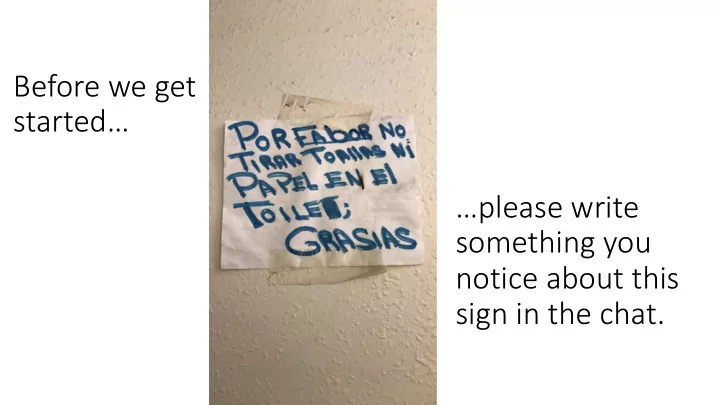

Before we get started… …please write something you notice about this sign in the chat.
Using the Language Around Us: Teaching Spanish Linguistics with Urban Signage Dr. Jhonni Carr Department of Spanish & Portuguese
Presentation Outline Introduction to Overview of the 4 Final module on Challenges and Linguistic modules of the social justice and next steps in the Landscape course identity in the development of Studies linguistic the course landscape
“The field of Linguistic Landscape (LL) Linguistic attempts to understand the motives, Landscape: An uses, ideologies, language varieties and International contestations of multiple forms of ‘languages’ as they are displayed in Journal (2015) public spaces”
In 2007…
Spanish in the Linguistic Landscape: Implications for Linguistic and Sociocultural Study
• Identify and explain basic methods of analysis from core areas of Linguistic Landscape Studies • Describe key developments, theories, and methodologies in the field • Reflect on the use and functions of particular languages in the linguistic landscape with reference to basic linguistic concepts Course • Understand the importance of language in cultural life, and develop sensitivity to the objectives observation of language phenomena in daily experience • Appreciate the diversity of language forms and usages around the world, especially in local settings • Consider power dimensions regarding the presence and absence of different languages and their translations
Module 1: Introduction to Linguistic Landscape Studies: Origins, Advances, and Methodological Approaches Module 2: Multilingualism and Language Attitudes and Ideologies of the Linguistic Landscape Module 3: Linguistic Variation in Urban Signage Module 4: Social Justice and Identity in the Linguistic Landscape Days 1-3 : Theory Days 4-5 : Real-world application Co Course Mo Modules (~ 3.5 wks each) Days 6-7 : Reflection
• Identify and explain basic concepts of social justice and language justice • Understand how social justice can Social Justice relate to the linguistic landscape Module: • Reflect on how these concepts can be applied to their own communities Learning • Hear first-hand from local community Objectives members about their view of the LL • Analyze the effect language and power can have on individuals’ identity, sense of belonging, and social solidarity
Days 1-3: Theory Social Justice Module Outline Days 4-5: Real-world application Days 6-7: Reflection • Readings à homework, discussions • Piller (2016) Linguistic Diversity and Social Justice: An Introduction to Applied Sociolinguistics • Antena’s Cómo construir la justicia del lenguaje • Forthcoming chapter from Linguistic Social Justice (Eds. Ramos Pellicia, MacGregor-Mendoza, and Niño-Murcia)
Days 1-3: Theory Social Justice Module Outline Days 4-5: Real-world application Days 6-7: Reflection • Class activities • Students work in small groups to breakdown the readings • Sample LL text + analyses
YO YOU ( plural ) MUST T ( singular ) HAVE A PERMIT T TO PLAY IN TH THIS FIELD. RA RAPISTS WILL BE SUS USCEPTI TIBLE TO POL POLIC ICE ACTION ION.
Days 1-3: Theory Social Justice Module Outline Days 4-5: Real-world application Days 6-7: Reflection • Class activities • Students work in small groups to breakdown the readings • Sample LL text + analyses • Practice analyzing LL texts
https://www.berkeleyside.com/2016/02/03/pappys -owner-responds-to-discrimination-charges
Days 1-3: Theory Social Justice Module Outline Days 4-5: Real-world application Days 6-7: Reflection • Class activities • Students work in small groups to breakdown the readings • Sample LL text + analyses • Practice analyzing LL texts • Debate • Homework: interview questions
Days 1-3: Theory Social Justice Module Outline Days 4-5: Real-world application Days 6-7: Reflection • Review interview questions in pairs • Review questions as a class, select 10 • Fieldwork preparation • Fieldwork in the Mission District: interviews with passersby • Reflection activity
Days 1-3: Theory Social Justice Module Outline Days 4-5: Real-world application Days 6-7: Reflection • A few groups briefly present their findings and reflections • Class discussion: debriefing/reflection of experiences • Assessment: apply theory + practice to analyze a sign using a language justice approach
Challenges and Next Steps in the Development of the Course
Acknowledgements
Antena. (2014). How to build language justice . Antena Books/Libros Antena. http://antenaantena.org/wp- content/uploads/2012/06/langjust.pdf Franco-Rodríguez, J. M. (2018). Spanish in Linguistic Landscapes of the U.S. In The Routledge Handbook of Spanish as a Heritage Language . Routledge. Komska, Y., Moyd, M., & Gramling, D. (2019). Linguistic Disobedience: Restoring Power to Civic Language . Palgrave Macmillan. Landry, R., & Bourhis, R. Y. (1997). Linguistic landscape and ethnolinguistic vitality: An empirical study. Journal of Language and Social Psychology , 16 (1), 23–49. https://doi.org/10.1177/0261927X970161002 References Linguistic Landscape: An International Journal . (n.d.). John Benjamins Publishing Company. Retrieved Februrary 24, 2020, from https://benjamins.com/catalog/ll Malinowski, D. (2016). Localizing the transdisciplinary in practice: A teaching account of a prototype undergraduate seminar on linguistic landscape. L2 Journal , 8 (4). https://doi.org/10.5070/L28430422 Martínez, Glenn A. & Train, Robert W. (forthcoming). Tension and Contention in Language Education for Latin@s in the United States . Routledge. Piller, I. (2016). Linguistic Diversity and Social Justice: An Introduction to Applied Sociolinguistics . Oxford University Press. Thoman, E. & Jolls, T. (2003). Literacy for the 21st century: An overview and orientation guide to media literacy education (Part 1: Theory). Malibu, CA: Center for Media Literacy.
Thanks for listening! Comments? Questions?
Recommend
More recommend